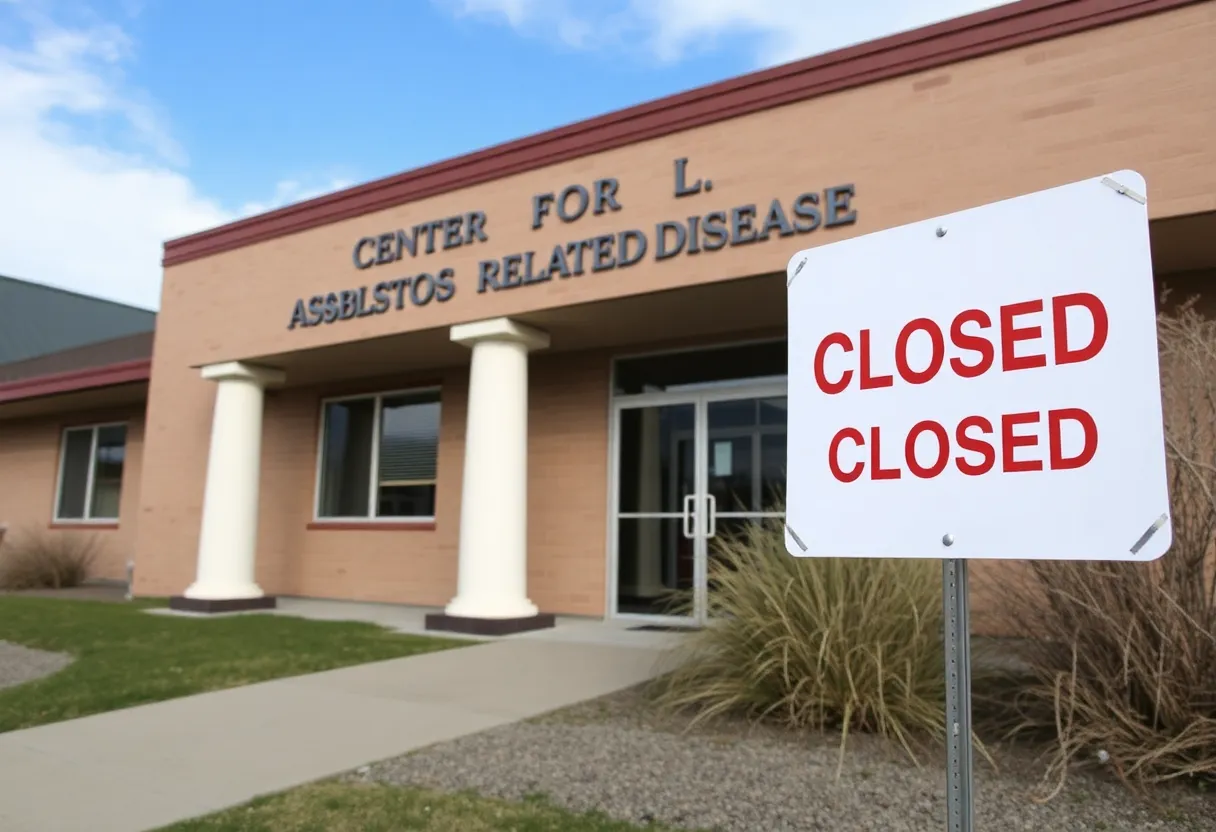News Summary
The Center for Asbestos Related Disease in Libby, Montana, has been ordered to close following a court ruling related to a $3.1 million judgment owed to BNSF Railway.
Closure of Asbestos Clinic Sends Shockwaves Through Libby, Montana
In a shocking turn of events, the Center for Asbestos Related Disease (CARD) in Libby, Montana, has been ordered to close its doors by the Lincoln County Sheriff’s Office. This closure is a direct result of a court ruling that allows for the seizure of the clinic’s assets, an action undertaken to satisfy a hefty $3.1 million judgment owed to BNSF Railway.
The Background of Asbestos Crisis in Libby
Libby, a town of approximately 3,000 residents located about 50 miles from the U.S.-Canada border, has been scarred by decades of asbestos-related health issues. These health problems trace their origins back to a nearby vermiculite mine that produced toxic asbestos dust for years, resulting in devastating consequences for the community. The Environmental Protection Agency recognized the impact of this environmental disaster by placing the mine on the Superfund program’s National Priorities List in 2002, signaling the need for ongoing cleanup efforts.
The mine, operational since 1881, has not only left a legacy of contaminated soil and air but has also resulted in a host of serious health conditions, including asbestosis and mesothelioma, diseases caused by inhaling fibers from asbestos. The plight of Libby residents like former locals Thomas Wells and Joyce Walder, who were both diagnosed with mesothelioma, underscores the far-reaching consequences of the pollution.
BNSF Railway’s Role in Libby’s Asbestos Troubles
BNSF Railway has been embroiled in legal battles surrounding its contributions to the pollution in Libby. The railway has faced numerous lawsuits from asbestos victims who claim that transporting contaminated material through the town exacerbated the health crisis. In a significant blow, 2023 saw BNSF successfully sue CARD, accusing the clinic of fraudulently allowing patients to claim government benefits when, in reality, many were not sick.
The lawsuit raised serious questions regarding the clinic’s responsibilities, challenging the validity of over 2,000 patient diagnoses, with a staggering 337 of these labeled as false. This was not just a civil matter; it involved the federal government, which provides specialized Medicare services for the town’s asbestos victims.
CARD’s Historic Contribution to Public Health
Founded as a part of St. John’s Lutheran Hospital in 2000 and transforming into a nonprofit organization in 2003, CARD had been a lifeline for Libby residents, offering essential services such as health screenings, monitoring, and treatment for health issues stemming from asbestos exposure for over two decades. Yet, as the clinic continues to grapple with its financial strains—largely resulting from uncertainty surrounding a key grant from the Centers for Disease Control and Prevention—its closure raises alarms about the future of public health in the area.
Before the closure, CARD employed about 19 people, all dedicated to addressing the community’s pressing health concerns. However, the fallout from the fraud judgment against the clinic culminated in bankruptcy proceedings that have complicated its ability to continue operations. Despite reaching a bankruptcy settlement with the federal government, attempts made by BNSF to collect on the fraud judgment have drawn critiques, leading to a court order that permitted authorities to seize CARD’s bank accounts and other assets.
Impact on the Community and Future Prospects
The recent developments have left the community in a state of uncertainty. Tracy McNew, CARD’s Executive Director, voiced the profound implications of the clinic’s closure on public health, particularly concerning the vital screenings for asbestos-related diseases that will now see significant reductions. The significant judgment against CARD and its subsequent repercussions reflect a complex web of accountability and public health needs intertwined with the historical negligence regarding asbestos exposure.
As the Lincoln County Sheriff’s Office takes measures to secure the building and assets of CARD, the future outlook for additional health services in a community that has long suffered from asbestos exposure remains precarious. As Libby awaits further court decisions on the clinic’s assets, residents are left grappling with the consequences of a health crisis that has silenced too many voices over the years.
Deeper Dive: News & Info About This Topic
HERE Resources
Disaster Strikes LIBBY: Asbestos Screening Clinic SHUT DOWN Amid Legal Chaos
Bestwall LLC Appeals Bankruptcy Ruling in Asbestos Liability Case
Closure of Asbestos Help Clinic Shakes Small Montana Town
The Asbestos Crisis in Libby Takes a New Turn: CARD Faces Financial Ruin
The Closure of CARD: A Troubling Chapter for Libby’s Asbestos Victims
Asbestos Corporation Ltd. Faces Legal Turmoil Amidst Mesothelioma Allegations
Clinic Closure Sends Shockwaves Through Libby, Montana
Southern California Edison Faces Class Action After Fatal Eaton Fire
Closure of Libby’s Asbestos Screening Clinic Raises Public Health Concerns
Clinic Closure Sparks Fear in Libby, Montana



















